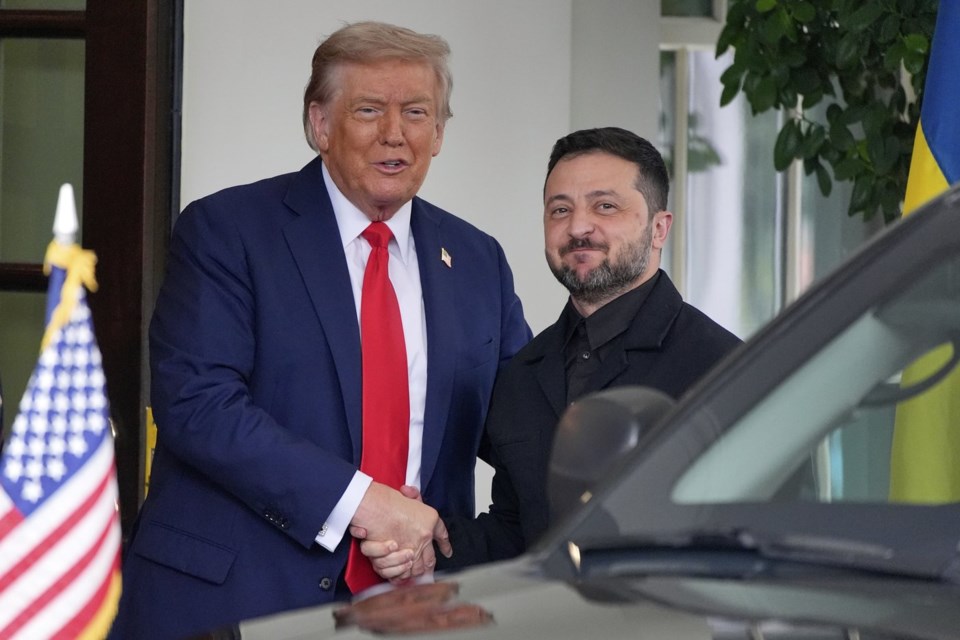OTTAWA — Foreign Affairs Minister Anita Anand said Monday the federal government is leaving "no stone unturned" to defend Canada's North as changes in the global order in recent years are having direct implications for Canada's Arctic sovereignty.
But one expert in international relations says Canada is being left out of crucial talks, with Prime Minister Mark Carney not among the leaders who gathered Monday at the White House for talks on the future of Ukraine.
Anand was in Helsinki to meet with her counterparts from Nordic countries to discuss Arctic security, which she said has become a more critical issue since Russia's full-scale invasion of Ukraine in February 2022.
Before that, Anand said NATO countries typically focused on shoring up the security along the eastern flank in Europe.
"NATO's gaze also has to shift westward and north because of the changing geopolitical landscape, especially following February 24, 2022," she said in a Monday call back from Finland with reporters.
"We are seeing increased activity, for example, in the Northwest Passage, we are seeing Russian infrastructure moved further and further north on the other side of the Arctic Circle," she said.
Canada can "leave no stone unturned, to protect and defend Canada's sovereignty," Anand said.
She spoke as European leaders, NATO Secretary-General Mark Rutte and Ukrainian President Volodymyr Zelenskyy met with U.S. President Donald Trump, to discuss how to end the war that started with Moscow annexing Crimea in 2014, before launching a wider invasion in 2022.
On Aug. 13, Prime Minister Mark Carney participated virtually in talks with Zelenskyy and European leaders, two days before Trump's summit with Russian President Vladimir Putin.
Carney was not involved in Monday's discussions at The White House and Anand did not say whether he had been invited, when asked Monday.
Fen Hampson, a senior Carleton University professor of international affairs, said it was a "conspicuous" absence. Analysis by the Kiel Institute shows Canada has contributed more aid to Ukraine — per capita and by dollar — than France and Italy, whose heads of government were both present.
"We're only a little over an hour away (by) flight from Washington. Why isn't Mark Carney around that table?" Hampson asked.
He suspects Trump's "particular dislike towards Canada" is why Carney wasn't at the table, despite Canada being directly affected by what happens.
If the U.S. pulls back support, Ottawa will likely need to give Ukraine more aid, he said. If there is a collective security guarantee, Ottawa might send troops. And if Trump forces Ukraine to accept Putin's terms, "it's the beginning of the end of the alliance" of NATO, Hampson said.
"These watershed meetings about Ukraine's future have enormous implications for the NATO alliance as a whole."
Talks in Washington were still ongoing Monday afternoon. Trump has talked about swapping land between areas occupied by Russia and Ukrainian territory, but many world leaders say this would undermine the integrity of borders, and incentivize Putin to further destabilize Europe.
Zelenskyy has said Kyiv needs security guarantees, which involve meaningful commitments of military force by more powerful countries if Russia makes more incursions into Ukraine, under any ceasefire or peace agreement.
Some have called for Ukraine to join the NATO military alliance, which Putin has repeatedly characterized as a threat to Russia's security. When asked whether Ukraine should join the alliance, Anand said it's up to the Ukrainian government what groupings it aspires to join.
Anand will meet Tuesday with Finnish President Alexander Stubb, after he returns to Helsinki from the White House.
Among the topics of discussion with Anand's counterparts will be how Canada can convince other countries that international law is fundamental, not just for peace in Ukraine but around the world.
Her role is "to ensure that my counterparts around the world are aware of Canada's position and to build the bridges necessary, to ensure that other countries also view international law, territorial integrity (and) the rules-based international order as fundamental institutions that must be protected and respected," she said.
The ministers will also talk about the overlap between critical minerals and security, she said, with defence and economic ties increasingly intertwined.
Typically, Anand said, "one would separate out projects that were focused on the economy and projects that were focused on defence and security."
Now, she said, "thinking in those silos is no longer appropriate, because Canada's economic security is tied deeply to our sovereignty overall and indeed protecting and defending our very country."
This report by The Canadian Press was first published Aug. 18, 2025.
Dylan Robertson, The Canadian Press



